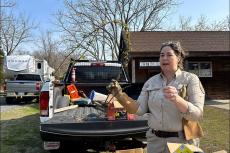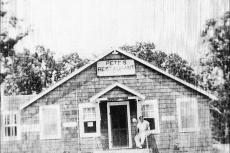A public hearing on a proposed amendment to East Hampton Town’s code with respect to littering and dump control drew advocates and opponents when the town board met last Thursday.
The proposed changes to the code would expand the definition of litter to include “gravel, loam, dirt, and other debris,” as well as prohibit “drag-out” of such materials onto public roadways and require that the contents of any vehicle containing yard waste be covered and secured. The motivation for the proposed changes includes complaints about drag-out of debris from commercial industrial sites such as sand and gravel mines.
Some public comment, from those addressing the board either in person or by phone, emphasized the environmental impact of dirt and other debris tracked onto roads and its inevitable migration beyond. Sara Davison, executive director of the Friends of Georgia Pond Foundation, spoke of the water quality impacts to that pond. Sediment carried out of industrial sites on the tires of trucks “washes directly downhill into Georgica,” the water quality of which is already impaired, she said. It can also overwhelm drainage basins, she said — when those are full of sediment and other detritus, stormwater will flow directly into the pond, potentially carrying pathogenic bacteria.
Carolyn Logan Gluck, chairwoman of the Wainscott Citizens Advisory Committee, conveyed “the entire committee’s support” for the proposed legislation, which she said “has long been a goal” of the group, citing the materials’ detrimental effect on the health and safety of people and the natural environment.
Two other residents spoke in favor of the proposed amendments, citing industrial sites in Wainscott and Springs. But two others spoke at length against them. Kris Almskog of P.W. Grosser Consulting, who represents Bistrian Materials on Springs-Fireplace Road, suggested that the proposals unfairly target individual operators or specific areas. They would also have unintended consequences for farmers, construction sites, “everything throughout the town,” he said.
The town does not require tracking pads — typically rubber mats installed at the entrances and exits of construction sites — in its building permit process, Mr. Almskog said. Such a requirement could “substantially reduce a lot of drag-out.” His client, he added, has a tracking pad, sweeps the street in front of his business at his own expense, and would be “more than willing to look at proactive measures” rather than the town “potentially targeting individuals for one reason or another.”
Andrew Strong, an attorney who has focused on human rights, also wondered aloud if the proposed legislation would have unintended consequences for farmers or construction workers, but worried more about the possibility that a misdemeanor conviction, rather than a violation, could lead to the deportation of immigrants. “I would be very cautious about putting things on the books that are criminal misdemeanors,” he told the board. Despite the proposed amendments’ worthy intentions, “town boards change,” but “what’s left are permanent records and immigration complications.” The language of the proposed amendments feels “dangerously vague,” he said, and “I can see it easily being interpreted in ways it’s not intended to be.”
Between Mr. Almskog and Mr. Strong’s remarks, David McMaster, an assistant town attorney who drafted the proposals with Councilwoman Kathee Burke-Gonzalez, told the board that there is no motivation to target individuals nor any reason the law cannot be enforced in tandem with other measures, such as tracking pads. Deterrence is the goal, he said.
Addressing Mr. Strong’s concerns, which he had conveyed previously in correspondence with the town, Mr. McMaster said, “This would have no negative effect on anyone’s immigration status. . . . Nobody is going to be deported over an immigration issue related to this.”
The hearing was closed.



